COVID-19 Updates from NPH
During this global threat, the NPH family continues to ensure essential food and care for the most vulnerable and needy in our society.
![]()
…
To learn more about one of NPH homes, including COVID-19/Coronavirus updates, click it on the map.
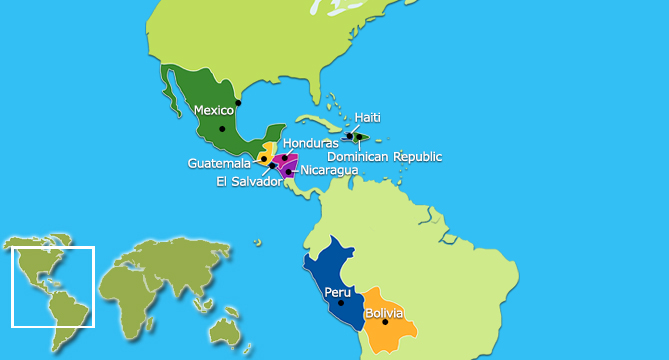
…
…
How the CARES Act Impacts Charitable Giving for 2020 ->
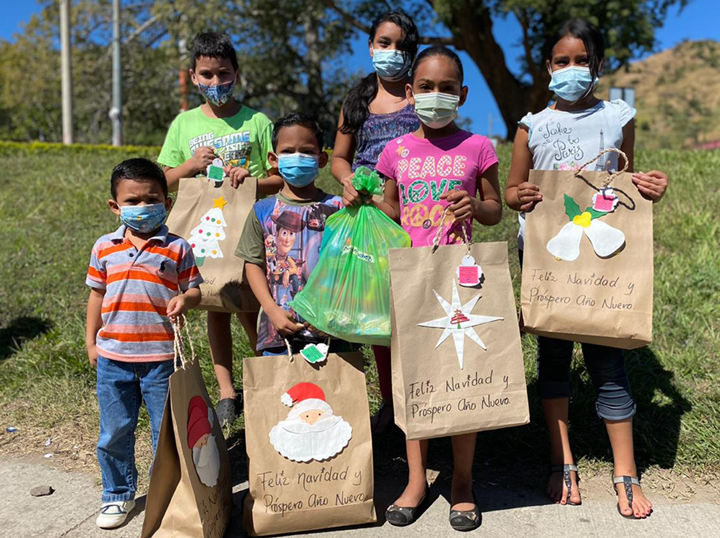 Update from Dr. Edwin Vallecillo
Update from Dr. Edwin Vallecillo
Director of Medical Services, NPH International
December 23, 2020
From NPHI Medical Services, we thank you all for your incredible work in combating COVID-19 throughout the NPH community. As we end the year, our population stays healthy and our environments are safe.
As we end the year, however, we ask you to continue practicing basic prevention and protection measures in the face of the persistent threat of COVID-19.
We remind you of these main prevention and protection measures:
- Wash your hands constantly with soap and water. Handwashing remains a key measure. Wash your hands as soon as you arrive home.
- Wear your mask constantly and consistently everywhere. If you visit places where there are many people, increase your vigilance with the use of your face mask in order to raise the level of safety of this measure.
- Always maintain social distancing.
- If you plan to be reunited with your family, practice these measures. Avoid meeting with people you do not know. If you do, take extra precaution.
- COVID-19 tests should continue to be performed on a regular basis.
- Avoid participating in activities with many people in enclosed spaces.
- If you have COVID-19-like symptoms, stay home and talk to your doctor.
- Always use hydroalcoholic gel. Keep it on hand.
- In NPH environments, increase handwashing, the use of hydroalcoholic gel, and access to hydroalcoholic gel stations.
These are basic measures that remain in place. Let us remember that COVID-19 is increasing again in all countries. Due to the Christmas and New Year’s Eve festivities, we must be extremely cautious and take care not to forget these basic measures.
We ask during these Christmas holidays that we do not forget the bond of family and that we strengthen our ties of community and brotherhood. The year has been a special and difficult one, therefore it is particularly important to practice prevention to end the old year and practice prevention to start the new one.
Happy Holidays from Medical Services. We wish you health and joy to end the year. God bless your homes and your families.
Photo above: NPH El Salvador
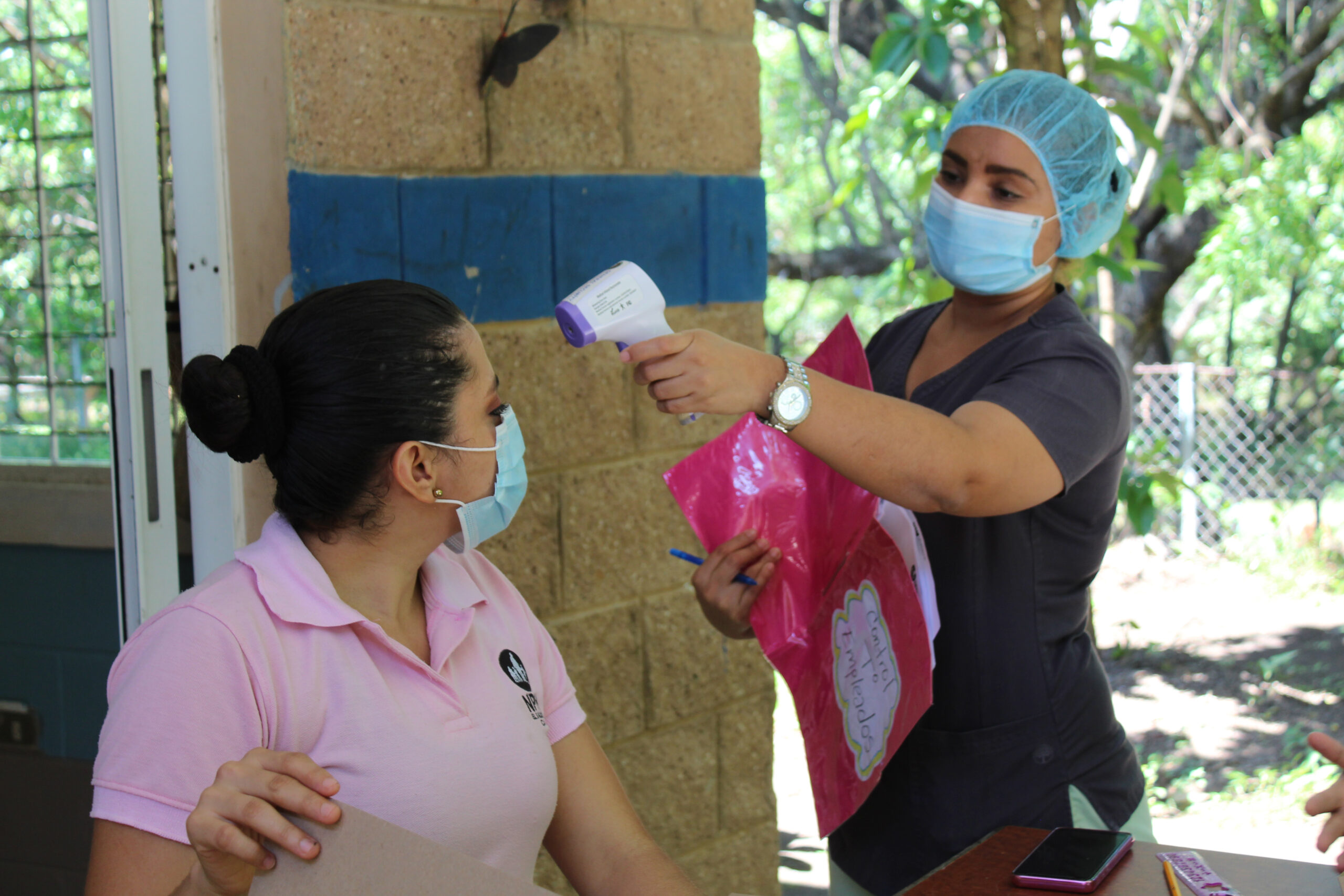 Update from Dr. Edwin Vallecillo
Update from Dr. Edwin Vallecillo
Director of Medical Services, NPH International
October 30, 2020
Recently during Golden Week, a festive period held in China October 1-7, Wuhan, the place where COVID-19 began, received nearly 19 million visitors, according to figures from the province’s department of culture and tourism. In what was one of the cities most affected by the virus, a city little was talked about and about which we knew nothing, life has returned to normal. (1)
However, in places where there has been political division at the national level, where there has been a blatant lack of respect for science and health professionals, confusion has spread and cases and deaths have increased. That’s why I say repeatedly: don’t politicize COVID-19. (2)
The fight against this pandemic is everyone’s business. We cannot have the economic recovery we want and live our lives as we did before the pandemic. We can keep our children in school, we can keep businesses open, we can preserve lives and livelihoods. We can do it. But we must all make concessions, commitments, and sacrifices. (3)
Making changes when needed is a sign of leadership and strength.
When leaders act quickly and deliberately, the virus can be suppressed.
Last week, the highest number of COVID-19 cases was reported to date. Many countries in the northern hemisphere are seeing a worrying increase in cases and hospitalizations. Intensive care units are also being filled to the fullest in some places, particularly in Europe and North America. (4) (5)
At NPH we continue to call all leaders to action. In our protection care settings, the use of the mask is already part of our daily habits. We recommend that resources be prioritized and allocated so that all children, adolescents, and employees have a cloth mask or similar that is comfortable, washable, and durable, with the aim of encouraging a culture of ongoing use of masks until this pandemic is contained worldwide. We have observed how families around the world are using masks, from younger children to older adults; therefore, children and adolescents in different NPH care settings should adopt this culture sooner rather than later.
The biggest dilemma in protection care settings is how to protect the most vulnerable, such as organizing staff to do the work and managing health personnel. The formula is not magical or difficult. We must not only avoid outbreaks at all costs, but we must also protect mental health and act primarily based on science and evidence. Therefore, we emphasize that the rigorous use of masks is the main answer to all these questions. In an environment where everyone is wearing a mask, that environment is safer. We cannot be radical and pretend that we should have zero cases, but if we have a case, we have to ensure that we do not have an outbreak. This is achieved when all boys, girls, adolescents, and employees are wearing a mask all the time. This measure is the most essential in the fight against the pandemic and so we want to emphasize it.
The cases of COVID-19 in NPH are on a downward trend, with new cases below five or even zero each week. An outbreak that occurred in Honduras in the previous months has been successfully contained, thanks to the excellent work of multiple teams that are actively providing their support and we gain more confidence in measures that have been increasingly implemented, which pleases us all.
The task is tough. Health teams invest significant time each day in COVID-19 surveillance and it is certainly a complex task.
One of our strongest concerns today is the normalization of specialized health services. Many external consultations remain closed, hospitals are still stressed by COVID-19, and many hospital areas remain redirected for COVID-19. We have noticed a significant decrease in the supply of services for chronically ill patients. Chronic disease does not take a vacation. In many cases, these aliments no longer monitored amid the COVID-19 phenomenon, so we fear that we will see an increase in mortality from chronic disease neglect. Thus, in our protection care settings we are aware of this risk and acting accordingly. But, the lack of support of public and private systems geared towards the care of the chronically ill is worrying.
In addition to the use of masks as a crucial measure to fight this pandemic, the second critical element is solidarity. We must remain in solidarity with our collaborators and with our neighbors, within our countries and beyond our borders. Solidarity must be the hallmark that distinguishes us and slowly takes us away from the tragedy that COVID-19 is causing. We must recognize that it is not about winning; it is about granting and protecting the mental health of all the people who help us move forward in our ventures.
We are still suffering from the consequences of this pandemic. We do not yet know how many more blows we will receive. The effects could hit us where it hurts the most; it can take away precious lives. We have not yet seen the worst.
Therefore, we must continue to listen to science, wear masks, and practice solidarity, at all costs.
We keep in constant prayer for all the sick and those who suffer. We pray for the souls and the eternal rest of those who have left us, especially our brother in NPH Honduras who recently left for the house of the Lord. We pray for some of our other brothers within NPH who are also fighting for their health today.
Cited Documents:
1. Wuhan, «la ciudad heroica»: cómo pasó de ser el foco de coronavirus en China a uno de sus principales polos turísticos. BBC News Mundo [Internet]. [citado 28 de octubre de 2020]; Disponible en: https://www.bbc.com/mundo/noticias-internacional-54629700
2. Alocución de apertura del Director General de la OMS en la conferencia de prensa sobre la COVID-19 del 23 de octubre de 2020 [Internet]. [citado 28 de octubre de 2020]. Disponible en: https://www.who.int/es/dg/speeches/detail/who-director-general-s-opening-remarks-at-the-media-briefing-on-covid-19—23-october-2020
3. Alocución de apertura del Director General de la OMS en la conferencia de prensa sobre la COVID-19 del 26 de octubre de 2020 [Internet]. [citado 28 de octubre de 2020]. Disponible en: https://www.who.int/es/dg/speeches/detail/who-director-general-s-opening-remarks-at-the-media-briefing-on-covid-19—26-october-2020
4. Ecuador Coronavirus (Live): 163.192 Cases | The Coronavirus App [Internet]. [citado 28 de octubre de 2020]. Disponible en: https://coronavirus.app/tracking/ecuador
5. COVID-19 Map [Internet]. Johns Hopkins Coronavirus Resource Center. [citado 28 de octubre de 2020]. Disponible en: https://coronavirus.jhu.edu/map.html
Photo above: NPH El Salvador
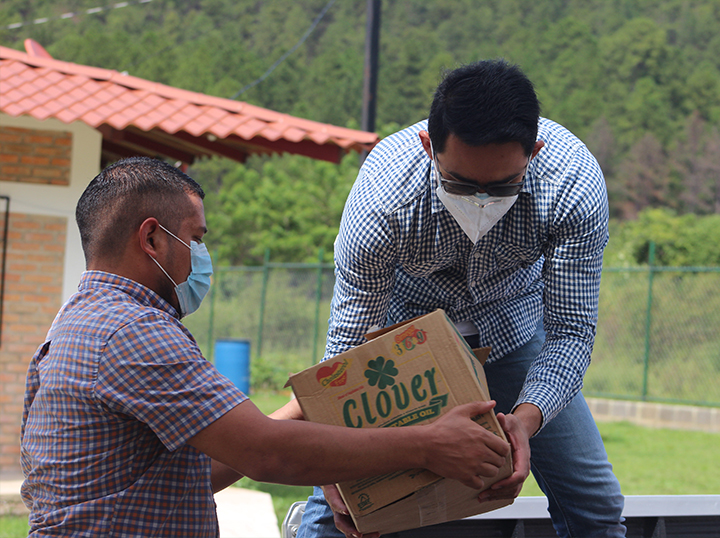 Update from Dr. Edwin Vallecillo
Update from Dr. Edwin Vallecillo
Director of Medical Services, NPH International
October 21, 2020
The WHO Solidarity trial released its interim results on 15 October 2020. The four treatments evaluated—including remdesivir, hydroxychloroquine, lopinavir/ritonavir, and interferon—were found to have little or no effect on overall mortality, ventilator usage time, or length of hospital stay in the patients studied. Other drugs continue to be evaluated; so far only corticosteroids have proven effective against severe and critical COVID-19. As winter approaches, the risk of new outbreaks in northern countries increases; this is why we are seeing reports of increased new cases of COVID-19 in Europe and the United States. Countries where NPH operates experience recovery rates between 70% and 80%, except for Honduras which has a low recovery rate. Mexico continues to lead the statistics in new cases and total number of deaths, while the other countries show a slight tendency toward stability in their curves, in particular Peru where there has been a downward trend in deaths and new cases, which until now is encouraging news.
Recently, some sectors have addressed the idea of letting the virus spread to achieve so-called “herd immunity.” However, herd immunity is a concept used in the field of vaccination and implies that a population can be protected against a particular virus if a vaccination threshold is reached. For example, herd immunity against measles requires vaccination of approximately 95% of the population. The remaining 5% will be protected because measles will not spread among vaccinated people. For polio, the threshold is about 80%.
In other words, herd immunity is achieved by protecting people against the virus, not by exposing them to the virus. Seroprevalence studies suggest that, in most countries, people infected with the COVID-19 virus account for less than 10% of the population. WHO recommends continuing case detection, isolation, testing, patient care, contact tracing, quarantine, physical distancing, hand hygiene, mask use, coughing and sneezing precautions, and ventilation, as well as avoiding crowds, among other precautions. WHO is leading an initiative to accelerate the development and production of COVID-19 tests, treatments, and vaccines and to ensure equitable access to them. COVAX is part of this initiative where more than 150 countries have come together to fund this initiative. The goal is to provide at least two billion doses by the end of 2021, which would mean a 20% vaccination rate for the people of the countries that make up the initiative. This would help end the acute phase of the pandemic and rebuild economies.
In the previous week, we received no reports of new COVID-19 cases in the NPH community, no NNAs (niños, niñas y adolescentes or boys, girls, and adolescents) or affected employees reported.
NPH continues to carry out ongoing monitoring by health teams against COVID-19 and prevention and protection actions are maintained in all care settings. Strategies continue to be attempted to create the new normal as the year progresses to its end.
We pray for those who suffer from this disease every day; we pray for them to maintain the strength to recover and move forward.
We pray for our entire global NPH community and we appreciate the permanent solidarity of thousands of exceptional collaborators. Thanks to their kindness, we are all one family.
Photo above: NPH Honduras
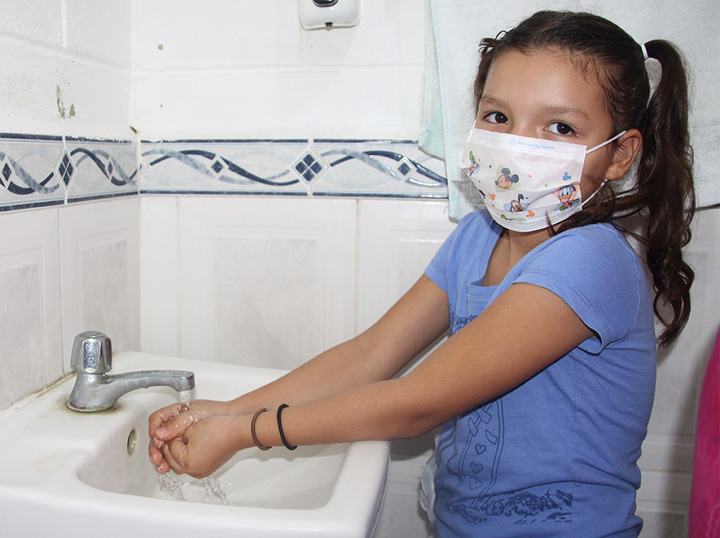 Update from Dr. Edwin Vallecillo
Update from Dr. Edwin Vallecillo
Director of Medical Services, NPH International
October 7, 2020
I begin by sharing the third encyclical recently written by Pope Francis, Fratelli Tutti (Brothers All, in English), which was signed on 3 October 2020 on the eve of the feast day of St. Francis of Assisi, in the city of Assisi, Italy.
The encyclical is dedicated to defining and exalting fraternity as a value and organizing principle of societies, nations, and global coexistence. I invite you to read this beautiful encyclical that carries a valuable message in times of uncertainty.
On the other hand, COVID-19 continues to gain ground. As you may know, cases of COVID-19 have exceeded 36 million globally and more than 1 million people have lost their lives because of this pandemic. This is undoubtedly a catastrophic loss of human life.
55% of the one million COVID-19 deaths have occurred in the Americas followed by 23% in Europe.
Overall, the highest percentage of cases has been reported in the 25-to-39 age group, and 50% of cases fall into the 25-to-64 age group. The death rate, however, increases with age and approximately 75% of deaths are seen in people age 65 and up.
COVID is moving like a sea wave, increasing again in Europe possibly due to increased surveillance, while in some Latin American countries there is a slight decline—in Peru, for example—compared to previous months.
Billions of people around the world have been affected by the COVID-19 pandemic, which is having an additional impact on people’s mental health. On 10 October, World Mental Health Day, WHO is hosting a major mental health event. The advocacy event will focus on the urgent need to address the world’s chronic underinvestment in mental health, a problem that has worsened during the COVID-19 pandemic.
WHO continues to warn of, “sustainable preparedness for health security and resilience: taking a society-wide approach and breaking the cycle of ‘panic and forgetfulness.’” As the world crosses a grim threshold of more than a million lives lost to COVID-19, many more are expected to have died from unprecedented disruptions to health systems. This pandemic highlights the need for sustainable health preparedness in emergencies, as COVID-19 will not be the world’s last health emergency.
NPH remains stable and firm in its protection and prevention measures. Last week we received reports of only one new case. The new normal is gradually settling in inside NPH residences, but certainly the challenge is far from disappearing.
The Latin American region could be entering a period of apparent calm, as we are experiencing a reduction in cases; however, we must remain vigilant because, like the waves of the sea, we can expect a second wave that is both stronger and quieter.
At the same time, the wave of inequality and the rise of extreme poverty continue to grow disproportionately.
We continue to recommend the core measures: sustained, ongoing use of face masks; maintain social distance; avoid crowds; seek medical attention if you are sick; ongoing practice of hand washing; and maintain prevention and education activities in the new normal.
We continue to pray for the health of our community and for global health. And we always appeal to national and international solidarity, as Pope Francis rightly mentions in his encyclical Brothers All.
We keep in constant prayer those who suffer sickness and hunger, that God is always at their side.
Photo above: NPH El Salvador
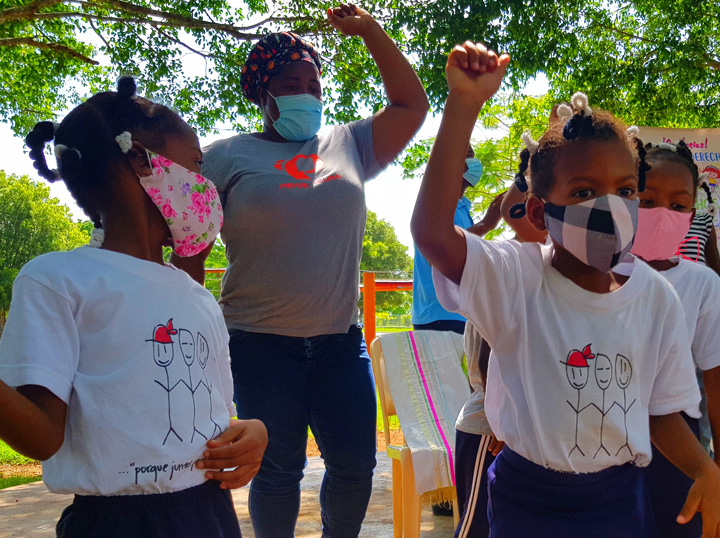 Update from Dr. Edwin Vallecillo
Update from Dr. Edwin Vallecillo
Director of Medical Services, NPH International
September 30, 2020
Last week we had reports of new COVID-19 infections in the NPH community, both NNAs (niños, niñas y adolescentes or boys, girls, and adolescents) and employees, three cases in total. All remain stable and receive primary care, plus monitoring of their health condition until their recovery.
At NPH, all children have healthcare coverage and receive guaranteed access to primary care services, thanks to our individual care programs and our public health programs within NPH. In this way we are always protecting the health of all NNAs within our programs and these services are offered on a regular basis.
Children within NPH have been more affected compared to employees, according to our reports, although the figures are similar: 54 NNAs versus 48 employees. So far, we have experienced only one fatality and the recovery rate is close to 71%, which exceeds the regional average of 69.6% among the countries where NPH operates. Our mortality rate is 0.9% compared to the regional rate of 4% in the countries where NPH operates.
At the Latin American level, we are still at the epicenter of the pandemic. We know the reasons why we continue to dominate statistics, which are mainly regional structural problems such as low educational level, poor coverage and access to health services without a defined structure, an informal market that prevails over the formal market, and poor infrastructure for public transport, among other unresolved problems.
Mexico and Peru continue to dominate the numbers of infected people in countries where NPH has a presence. Mexico is the leader with a total of 830,291 cases to the day of this report (September 30) and a mortality rate of 9.95%, a high percentage. We have also received news that health personnel face high risk of contagion due to a lack of medical supplies and personal protective equipment, with a total of 1,320 deaths according to the latest statistics, which makes Mexico the country where the most health personnel have died from this pandemic, while Peru ranks ninth.
Our main message is to urge our community to maintain and permanently reinforce preventive activities, both for COVID-19 and to address the psychological and social consequences that COVID-19 causes in general.
We continue to reinforce the need for mandatory use of masks. The mask is now and should be part of our daily routine. Scientific evidence supports the use of masks to help reduce COVID transmission significantly.
We continue to reinforce the need to practice social distancing and avoid crowds, stay home if you feel sick, and seek medical support either by telemedicine or with your local doctor if you are facing illness.
We pray for health, for all the people who suffer from this disease and other diseases, and we pray for their recovery and total rehabilitation.
Photo above: NPH Dominican Republic
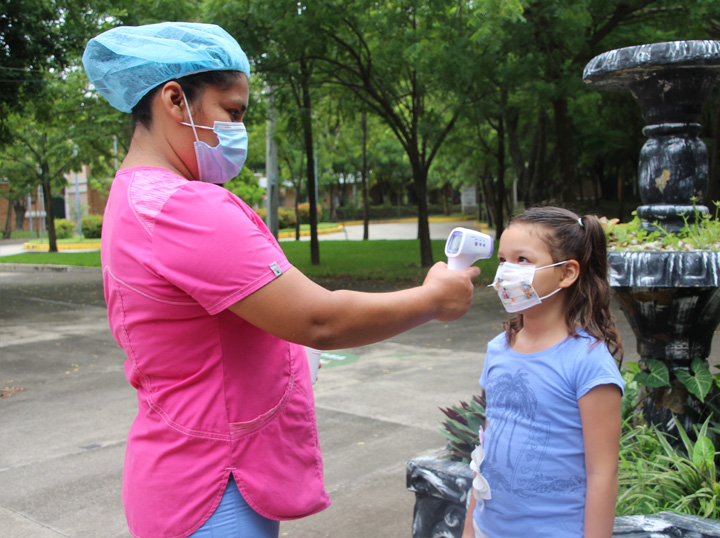 Update from Dr. Edwin Vallecillo
Update from Dr. Edwin Vallecillo
Director of Medical Services, NPH International
September 6, 2020
Latin America remains the epicenter of the pandemic. According to our weekly tracker, Peru and Mexico continue to lead among the countries where NPH operates, with respect to the report of new cases and total deaths. Mexico is reporting more than 60,000 total deaths nationwide.
NPH homes remain safe and stable, although last week was a difficult one for the NPH family to lose an important family member, Wilmer Arias, and we hope that God already has Wilmer in his kingdom. We also mourn the tragic death of a doctor from Saint Damian Hospital and her son in Haiti.
We continue to highlight the need to learn the concept of “the new normal” and practice the new rules of social co-existence, which include the correct use of masks, maintaining social distance, avoiding crowds, and self-isolating or staying at home if you are sick.
We continue to stress the need to enhance mental health-oriented activities and services. We must search for strategies to reactivate these services safely so that they can reach those who need them most.
We continue to call attention to NNA (boys, girls, and adolescents) who suffer from chronic diseases, to seek health alternatives, to continue providing necessary services, and to ensure that their diseases remain under control.
We continue to call attention to this second part of the year. Let us seek to alleviate the negative effects of isolation and quarantines, seek to be creative and not hide our realities, to recognize the consequences of the pandemic in its different dimensions, not just the economic ones, and proactively continue to seek creative and safe solutions.
We continue to keep the whole NPH family in our prayers, especially the most vulnerable members, those who suffer from chronic diseases, those who do not find solutions to their problems, may God give them comfort and strength to overcome these difficulties.
We thank all people with good hearts who are always showing us their solidarity.
Photo above: NPH El Salvador
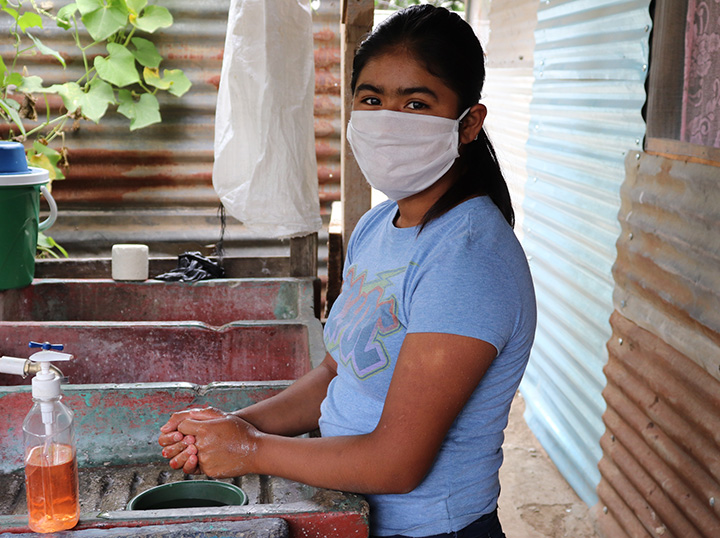 Update from Dr. Edwin Vallecillo
Update from Dr. Edwin Vallecillo
Director of Medical Services, NPH International
August 30, 2020
NPH homes remain stable and safe for the children and adolescents who reside there. All health prevention measures continue to be implemented and, so far, we have not encountered any problems beyond our control. In one home that is facing an outbreak, this outbreak is increasingly coming under our control. Thanks to strict and daily medical monitoring, a group of highly vulnerable people that were affected are managing to overcome COVID, although we are always afraid of the potential Post-COVID complications. They are being closely monitored so that we can act early in case of any complications.
In some homes, the quarantine protocol has changed. Employees now quarantine in their homes with their families and are administered a rapid test before entering the NPH residence. We are becoming more comfortable with this practice and we are learning from it. Though some homes have reported detection of a positive case within their small group population, they have conducted a general isolation within the home for 14 days according to protocol.
Homes, under the leadership of their doctors and nurses, apply appropriate measures and recommendations every day always under the premise of keeping homes and children safe. This create a dynamic of constant decision-making or rolling changes to work plans but, for now, it is the right strategy to keep the residential environments safe.
Latin America continues to show an increase in cases every day; it is still the epicenter of the novel coronavirus pandemic. We see parts of economies reopening, like schools in the case of Nicaragua and Haiti, but we have yet to see the results of these decisions. NPH schools have implemented prevention and protection protocols, but reopening is still a major logistical challenge.
Hospitals are still refusing elective procedure and specialized consultations for the vast majority of patients, including in the private sector. Though reports stay primary care is being strengthened in order to alleviate the burden on hospitals, in most countries the picture still is a complex one. Most doctors and nurses are dying and the vast majority of hospitals in the public network are not infection-free—that is, they are hot spots for COVID-19 contagion.
In the few hospitals operating in the region, the priority is COVID, somewhat forgetting that other medical conditions still exist and people suffer from them.
We see the example of the insurance system offered by social security in Honduras. Because 40% of private companies have closed their doors, they are not paying into the public insurance system. Hence, the social security system has seen its income cut and is now asking employers pay for the incapacity of their employees. This is pushing workers to continue working, even when they don’t fully meet infection prevention restrictions. Economic factors weigh heavily on the system and it can no longer bear the high costs generated by COVID-19 incapacity.
Consequently, this creates unstable and unsafe environments both in the workplace and in open society. Yet, in the middle of this catastrophe stands NPH, going as far as needed to respond appropriately to the need of the population under our protection, our employees, beneficiaries of programs in the communities, but not least of all hermanos mayores and those close to the NPH family. Even in this catastrophe, we remain committed to finding solutions.
Clearly the commitment we show at NPH is not possible without the enormous work that fundraisers do both in Latin America and in Offices outside the region. Their work is and will continue to be valuable, helping us to continue our commitment to deliver adequate healthcare responses in this unequal, high-need region.
Though our fear of COVID-19 may lessen which each day that passes, we are already tired, because we are already infected, or because we feel strong, we continue to strongly recommend that the basic health measures be practiced to fight COVID 19, including the mandatory use of masks, social distancing, avoiding agglomerated places, isolating ourselves if we are sick and taking care of our families and our communities.
Although despite the fact that each day that passes, we may lose our fear of COVID, because we are already tired, because we are already infected, or because we feel strong, we continue to strongly recommend that basic health measures be practiced against COVID 19, which are the mandatory use of masks, maintaining social distance, avoiding crowded places, isolating ourselves if we are sick, and taking care of our families and our communities.
We continue to appeal to international solidarity and national unity, continue to call for strength for our leaders within NPH at all levels, and keep the great NPH family in permanent prayer.
We give thanks for our lives and our families’ lives, and we honor all those who have lost loved ones to this Pandemic.
Photo above: A youth in the NPH OneFamily Program in Guatemala
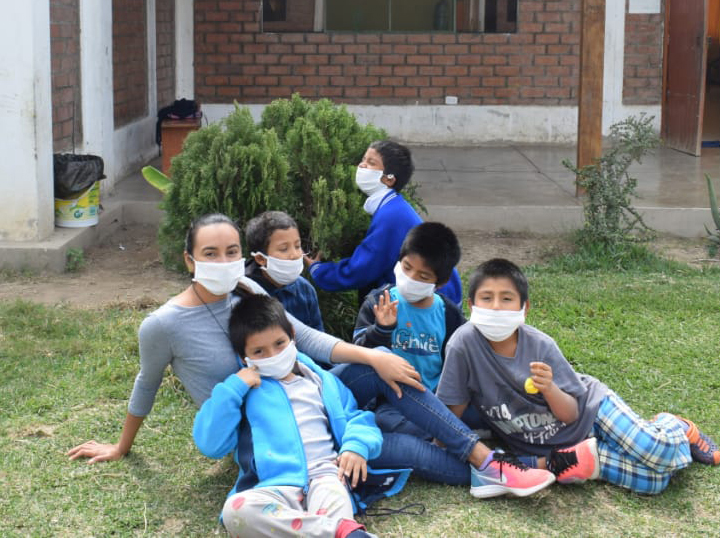 Update from Dr. Edwin Vallecillo
Update from Dr. Edwin Vallecillo
Director of Medical Services, NPH International
August 20, 2020
New Normal: What the new normal means for NPH
From the perspective of NPHI Medical Services, we think the new normal is acceptance of the fact that COVID 19 will be with us for the next 6 months, at least, and we must look for different and creative ways to perform our daily routines.
A new normal does not mean the danger has passed, but rather that risks remain present, we understand them better, and we can apply intelligent measures to live with the virus among us. Therefore, in this new normal there are measures that are urgent to review and apply in the case that we have not yet done so within our homes:
1. Staff or anyone entering and leaving a residence must wear a mask as long as they remain inside NPH homes. The use of masks is one of the most effective measures to reduce contagion and prevent an outbreak.
2. Population segmentation: All households must review their population and identify the pertinent groups therein, i.e., segmentation of children with disabilities, boys’ homes, girls’ homes, older adults, and other groups present in the homes. For each segmented group, living routines should be established, including rest, work, and recreation. The ultimate goal of segmentation is that one segmented group does not mingle with another group. That is, each group will have its own routine and these routines can be reviewed and changed every 14 days. This practice minimizes the spread of a potential outbreak within the house.
3. The ban on large group activities or meetings of more than 15 to 25 people should be maintained. Although general activities within the homes are not recommended, activities can be carried out only between people within the same segmented group while practicing social distancing.
4. It is strongly recommended that all staff who can practice telework and work from home should do so, thus reducing the number of people who reside inside a home.
5. It is strongly recommended to purchase rapid tests and apply them to all personnel who periodically enter and leave NPH homes. The goal is to identify asymptomatic people who have already become infected, but have not developed symptoms and to identify people who are sick with mild symptoms. This helps to maintain permanent ongoing monitoring of the virus, learn where the virus is, and take action, as appropriate.
6. It is recommended that COVID-19 campaigns be carried out now to reinforce recommended practices, to talk about what the new normal means, to learn about current measures that are being implemented, and to train people to continue to practice prevention intelligently in the face of the new normal that we must live in.
7. It is recommended that we analyze quarantines and redesign the quarantine practice, as appropriate.
8. Hand washing, use of hydroalcoholic gel, and all hygiene and disinfection measures to treat surfaces and other areas should continue to be applied indefinitely.
9. When a positive case is identified, the patient’s contacts should be accurately tracked and those people strictly quarantined for 14 days.
10. Places for isolation and treatment of patients should be kept ready to accept and attend to a positive case at any time.
These are particularly important recommendations, which, if followed strategically and in an organized manner, will significantly diminish the chance of dealing with an outbreak.
The new normal means learning to live with the virus not only without losing vigilance, but also without losing the opportunity to look for new ways to carry on with our routines and ways of life. This is important because we anticipate that the virus will be among us for at least the next six months.
Photo above: Children at NPH Peru
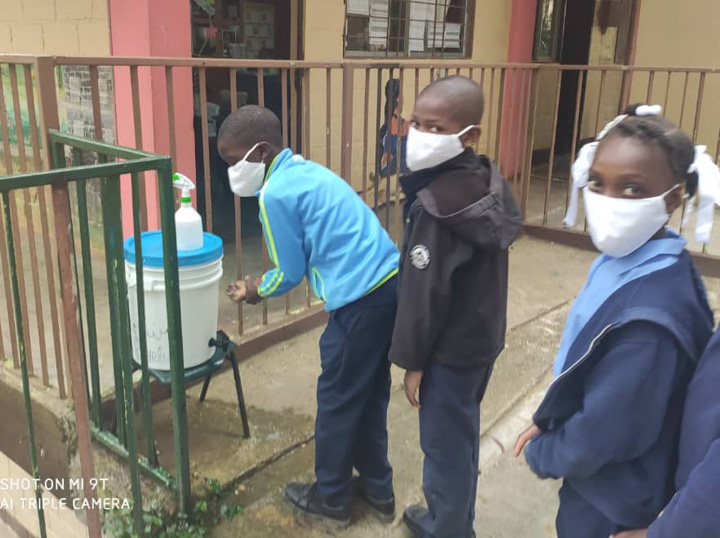 Update from Dr. Edwin Vallecillo
Update from Dr. Edwin Vallecillo
Director of Medical Services, NPH International
August 12, 2020
In Latin America access to regular healthcare services has been radically affected by the pandemic. Hospitals are seeing a high demand for care for COVID-19 patients; primary care and specialized consultation services are partially or completely closed across entire regions.
Rural areas of Latin America have traditionally had limited coverage and minimal access to basic health services, especially regarding vaccination programs, chronic disease, disability care, and disease prevention.
Confinement measures have made these problems worse. We continue to be concerned about the lack of access to basic health services.
Other epidemics, such as obesity, cardiovascular disease, diabetes, and vaccine-preventable diseases are at risk of proliferating and once again becoming factors in the advancement of sustainable development goals for health outcomes.
We have received reports of patients with COVID-19 infections who go to a hospital for the first time, only to learn they have diabetes or hypertension, precisely because of this poor access to services. In many cases, this combination of a chronic disease plus a COVID infection is fatal.
A sick society cannot prosper; it cannot advance in achieving its goals. A sick society generates high rates of spending on basic care and necessities, often in regions with small national budgets to fund these needs.
At NPH, confinement is taking a toll. Although our population with chronic diseases and disabilities receives prioritized services and extraordinary supervision, we are concerned that the lack of public primary care and specialized services may work against vulnerable groups who today find themselves with reduced access to their usual services.
We call on all of you to remain vigilant and alert to our most vulnerable populations and those suffering with chronic disease and disability. We call for activating service channels, researching health networks to uncover available services, and insisting on services that are necessary and cannot be delayed until the pandemic shows signs of waning.
NPH is a network of people helping others: our communal resilience is exemplified by people around us and within our communities who provide care and protect us. It is important to let others know that we can be there for them in hard times—especially for these vulnerable populations, the sick, and the disabled.
NPH stands firm in its prevention measures. All measures initially applied at the beginning of the outbreak remain in force. Use of masks is mandatory; we continue to practice social distancing, hand washing, respiratory hygiene, and quarantine.
We emphasize the need to increase capacity within NPH for rapid COVID testing as a strategy in the diagnosis and tracking of chronic carriers of the disease.
Many countries are beginning to reopen and we at NPH remain open to the idea. But anticipating how social behavior may evolve as schools in some areas start to open, we continue to monitor the results of this and other activities. We hope that, by now, we have learned valuable lessons.
At NPH, children and youth remain safe and live in healthy environments. In one of our homes facing an active COVID-19 outbreak, the team seems to be gaining ground on the virus, but it is still too early to talk about victories.
We are excited about news of vaccines and new treatments, but the reality is we must create a balance between health and the economy, applying all the lessons learned, practicing all prevention measures, and pushing our respective societies to join forces in this common struggle to keep the virus at bay.
It is not our intention to live in a perpetual COVID bubble, however, we want to be cautious and take firm steps when the time is right and when the region shows signs of ongoing social stability.
We keep in our prayers the health of our entire community and the NPH family. We ask for unity among our leaders and for international solidarity.
We pray for all those who’ve lost a loved one to COVID-19 and we pray for all those who daily fight this evil, that God will continue to give them the strength, health, and encouragement to move forward.
Photo above: Hand washing station at NPH Haiti
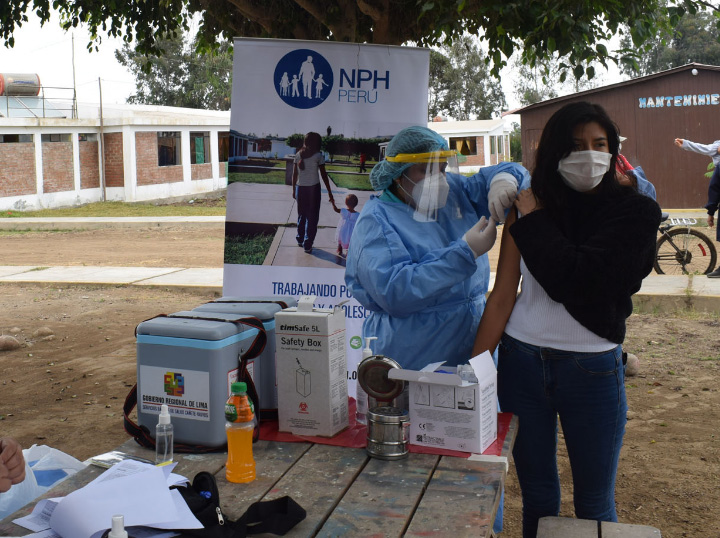 Update from Dr. Edwin Vallecillo
Update from Dr. Edwin Vallecillo
Director of Medical Services, NPH International
August 4, 2020
United Nations Sustainable Development Goal number 3 aims to secure healthy lives and promote well-being for all ages. This goal is suffering a major setback during the pandemic. According to historical records, this novel coronavirus is the first to cause a pandemic in the proportion and scale we currently face by causing a tremendous impact not only on health, but also on socioeconomic status. We are learning a lesson: Strong, prepared primary healthcare is the best response to these types of epidemics. Therefore, at NPH we continue to work to strengthen primary or top-level care teams. We invest strategically and support teams that provide primary health response in communities and homes. This is a highly effective strategy that guarantees better preparedness for future epidemics.
Staying strong and united against this pandemic is our only way out. The solution is in our hands; it is in everyone’s hands. We must continue to implement the complete spectrum of measures to the fullest to prevent the transmission of this elusive virus within our communities.
This story had a different ending for one of our most vulnerable girls, an important member of the NPH family who suffered from severe disabilities, similar to her friends and housemates who suffer from similar conditions. After an apparent good recovery from a COVID-19 infection, she ultimately lost the battle and now rests in peace. Her loss saddens us greatly and we honor her memory by remembering her courage and all the love for her that remains in our hearts. We know that today there is an angel in heaven who will always be a cherished member of the NPH family.
I remember little Rosalba on the day of her baptism two years ago when I became her godfather for the christening; her loss moves me. I will always remember her fragility and purity. And I will continue to admire her for all the strength she showed in her walk through this life.
These are dire times and COVID-19 has yet to show us all that it can throw at us. There are still many surprises that could come with this virus and this scares us greatly. In Latin America, COVID-19 is only one more link in a chain of social calamity. We must continue to fight forcefully. We must unite our forces and remain ‘in community.’ We cannot avoid completely that bad things may happen, but we can continue to be prepared. We can continue to take our help and our hope to forgotten places and unprotected people—to the children in our protection programs as well as our prevention programs.
Today we suffer our first loss in the NPH family due to this virus, but we remain more motivated than ever to continue fighting in their memory. We are confident that as NPH channels all its resources and energies to remain in solidarity in the fight against this evil that we will succeed in our struggle to protect the most vulnerable in Latin America.
We continue to call for international solidarity and national unity. We pray for our leaders to continue to gain wisdom in these uncertain times. And we pray that NPH will remain united in faith and hope.
We deeply regret the loss of Rosalba. We stand in solidarity with the NPH family in Honduras now in pain. We wish them strength and comfort in these difficult times.
May God continue to be their guide and their rock.
Photo above: A youth gets a flu vaccine at NPH Peru.
COVID-19 Updates from NPH: March – July 2020 ->
Related Information
• From Pequeño to NPHI Medical Director
• How Your Help Makes an Impact at NPH
• “A message from Bob Costas” – April 7, 2020
• “NPH Dominican Republic: We’ll Get Through This Together” – April 1, 2020
• “NPH El Salvador: COVID-19: A Physician Faces Her Greatest Challenge” – March 31, 2020
• “NPH Peru: Volunteers Lift Spirits Under Quarantine” – March 31, 2020
• “NPH Haiti and St. Luke Prepare for COVID-19” – March 27, 2020
• “NPH Bolivia: Staying Busy During Quarantine” – March 26, 2020
• “NPH Mexico Adopts COVID-19 Safeguards While Upholding the Call to Serve” – March 26, 2020
• “NPH Honduras: Amid Chaos, We Stand United” – March 24, 2020
• “NPH Honduras Highlights Its Heroes Amid the Coronavirus Crisis” – March 20, 2020
• “NPH El Salvador Children Send Love to Virus Sufferers” – March 20, 2020
• “NPH Dominican Republic Takes Preventive Measures To Protect Children” – March 20, 2020
• BLOG by William Stavinoha, MD: Neighbors Far Away – March 20, 2020







